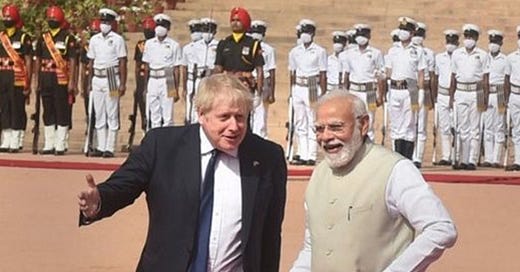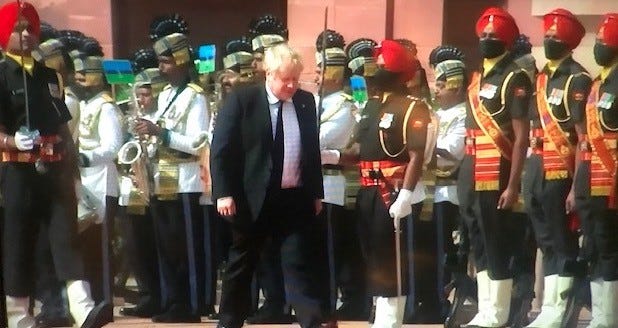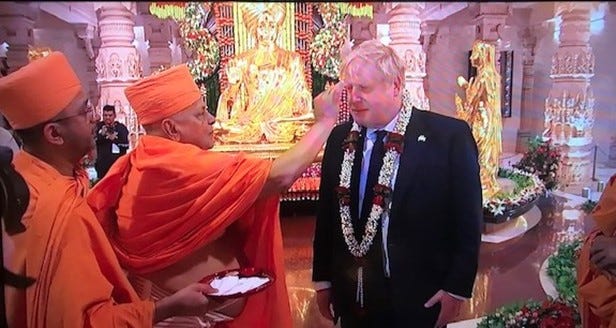Boris Johnson fails to challenge India’s stand on Russia and Ukraine
“Convivial” talks on Russia
By: John Elliott
Boris Johnson risks losing his job as UK’s rule-breaking prime minister next month, but he has been at his boosterish and scruffy best during a two-day visit to India, despite being hounded by British television journalists questioning his political future.
With his jacket unbuttoned and flapping open even on the most formal occasions, he enthusiastically launched deals that conveniently rounded off at £1bn, and heralded a free trade agreement with an almost certainly impossible six-month signing deadline.
Johnson’s most significant move was his virtual acceptance of India’s refusal to vote at the United Nations against the Russian invasion of Ukraine, and its continued trading in oil and other commodities, though he did condemn “autocratic coercion around the world”.
On his political future, he was asked, “You are like a cat with nine lives – yet how many have you got left?” by an ITV News reporter during a series of similar media questions.
This arose from a political crisis that erupted while Johnson was flying to India. It became clear that the government might not win a vote on April 21 to delay a demand for a formal inquiry into whether he had misled parliament when he said (on several occasions) that he did not think Covid restrictions had been broken by parties in his Downing Street offices and flat.
That led to the government accepting a demand for a parliamentary inquiry, which will take place after local council elections early next month – alongside an existing civil service inquiry into the parties. There are also continuing police investigations that have already led to Johnson paying a £50 fine. News of more fines emerged as Johnson flew back to London.
On Ukraine, Johnson noted in a press conference that Narendra Modi, India’s prime minister, had been outspoken in criticism of the Russian invasion. He said Mod had spoken several times with Vladimir Putin “to ask what on earth he thinks he is doing and where he thinks this is going”.
India wanted the “Russians out” but, Johnson added with virtual endorsement, “there is a difference in the balance [with other countries] because India has an historic relationship with Russia which everyone understands and accepts”. That was not going to change.
President Biden and other western leaders seem unlikely to agree. They might also be surprised that Harsh Vardhan Shringla, India’s top diplomat and the foreign secretary, told a press conference there had been “no pressure” from Johnson on Ukraine. The two prime ministers had a “very very useful exchange” in “very convivial terms”.
A joint statement said both sides “expressed in strongest terms their concern about the ongoing conflict and humanitarian situation in Ukraine. They unequivocally condemned civilian deaths, and reiterated the need for an immediate cessation of hostilities and a peaceful resolution of the conflict”.
That neatly rounded off the discussion, but it means that Johnson did not use his visit to persuade Modi to replace India’s abstentions at the UN with votes against Russia – something that other countries’ leaders might have hoped he would do.
Johnson also went further than some critics would have wished with an agreement on a “new and expanded Defense and Security Partnership” with India that includes co-operation on cyber security and on research and co-production – items that have been in progress for many years.
The Times (London) on April 21 argued against defense deals co-operation, saying “Boris Johnson must stress that there will be a cost to failing to stand with the West against Russian aggression”.
Johnson’s one Ukraine-linked gesture was (reportedly) having a Russian-made Mi-17 helicopter replaced by an American Chinook to ferry him to and from a British JCB construction equipment factory in Gujarat, where he began his visit on April 21.
He said that he had received such a warm welcome in Gujarat, Modi’s home state, that he felt like Sachin Tendulkar, the famous Indian cricketer. Johnson called Modi khaas dost (special friend) but Modi did not meet him in Gujarat, as he has done for leaders like Xi Jinping and Donald Trump.
Instead, Johnson was greeted by Modi today in Delhi with a formal state welcome to a trip that was twice postponed last year because of the Covid pandemic. Johnson had a virtual summit with Modi online last May and the agreements done today build on what was agreed then.
There have been plans for a free trade agreement for more than a year and little progress has been made so far, despite some talk of an interim deal to speed up relaxations of some tariffs.
There are wide gaps between the two sides on key issues such as visas, services, manufactured goods and whisky. Modi said that he hoped for a deal by the end of this year. But Johnson wants to beat the European Union to an agreement – European Commission president Ursula Von Der Leyen is in Delhi next week – so he has said he wants it “done by Diwali”, a major Indian festival that falls on October 24.
The outcome of such top-level visits and plans between the UK and India have not in the past lived up to the initial enthusiasm and expectations – something that might happen to Johnson who, asked by a journalist if he would still be prime minister by Diwali, answered “Yes!”.
John Elliott is Asia Sentinel’s South Asia correspondent. He blogs at Riding the Elephant.







